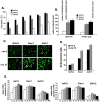Oncosuppressive suicide gene virotherapy "PVH1-yCD/5-FC" for pancreatic peritoneal carcinomatosis treatment: NFκB and Akt/PI3K involvement
- PMID: 23967078
- PMCID: PMC3743896
- DOI: 10.1371/journal.pone.0070594
Oncosuppressive suicide gene virotherapy "PVH1-yCD/5-FC" for pancreatic peritoneal carcinomatosis treatment: NFκB and Akt/PI3K involvement
Abstract
Peritoneal carcinomatosis is common in advanced pancreatic cancer. Despite current standard treatment, patients with this disease until recently were considered incurable. Cancer gene therapy using oncolytic viruses have generated much interest over the past few years. Here, we investigated a new gene directed enzyme prodrug therapy (GDEPT) approach for an oncosuppressive virotherapy strategy using parvovirus H1 (PV-H1) which preferentially replicates and kills malignant cells. Although, PV-H1 is not potent enough to destroy tumors, it represents an attractive vector for cancer gene therapy. We therefore sought to determine whether the suicide gene/prodrug system, yCD/5-FC could be rationally combined to PV-H1 augmenting its intrinsic oncolytic activity for pancreatic cancer prevention and treatment. We showed that the engineered recombinant parvovirus rPVH1-yCD with 5-FC treatment increased significantly the intrinsic cytotoxic effect and resulted in potent induction of apoptosis and tumor growth inhibition in chemosensitive and chemoresistant cells. Additionally, the suicide gene-expressing PV-H1 infection reduced significantly the constitutive activities of NFκB and Akt/PI3K. Combination of their pharmacological inhibitors (MG132 and LY294002) with rPVH1-yCD/5-FC resulted in substantial increase of antitumor activity. In vivo, high and sustained expression of NS1 and yCD was observed in the disseminated tumor nodules and absent in normal tissues. Treatment of mice bearing intraperitoneal pancreatic carcinomatosis with rPVH1-yCD/5-FC resulted in a drastic inhibition of tumor cell spreading and subsequent increase in long-term survival. Together, the presented data show the improved oncolytic activity of wPV-H1 by yCD/5-FC and thus provides valuable effective and promising virotherapy strategy for prevention of tumor recurrence and treatment. In the light of this study, the suicide gene parvovirotherapy approach represents a new weapon in the war against pancreatic cancer. Moreover, these preliminary accomplishments are opening new field for future development of new combined targeted therapies to have a meaningful impact on advanced cancer.
Conflict of interest statement
Figures






References
-
- Ahlgren JD (1996) Epidemiology and risk factors in pancreatic cancer. Semin Oncol 23: 241–250. - PubMed
-
- Anderson KE, Potter JD, Mack TM (1996). Pancreatic cancer. In Cancer Epidemiology and Prevention, 2nd ed, eds Schottenfeld D, Fraumani JF, pp. 725–71. Oxford University Press, New York.
-
- Beger HG, Gansauge F, Leder G (2002) Pancreatic cancer: who benefits from curative resection? Can J Gastroenterol 16: 117–120. - PubMed
-
- Hu JCC, Coffin RS, Davis CJ, Graham NJ, Groves N, et al. (2006) A phase I study of OncoVEXGM-CSF, a second-generation oncolytic herpes simplex virus expressing granulocyte macrophage colony-stimulating factor. Clin Cancer Res 12: 6737–6747. - PubMed
Publication types
MeSH terms
Substances
LinkOut - more resources
Full Text Sources
Other Literature Sources
Medical
Miscellaneous

